Lagwagon - Interview
by Anastasia Grabov
published: 30 / 11 / 2005
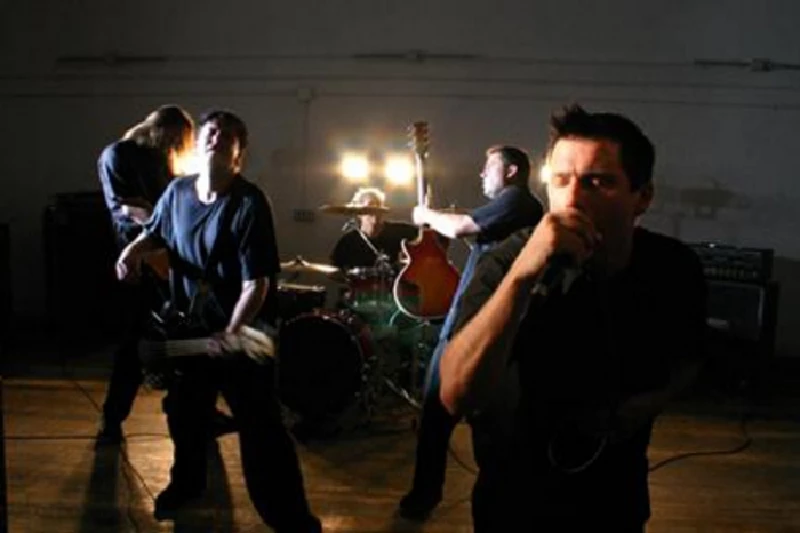
intro
Californian punks Lagwagon were the first band to sign to seminal punk label Fat Wreck Records. Singer Joey Cape talks to Ana Grabov about his ongoing loyalty to the label, his band's longevity and his two side projects
Without knowing it at the time, Lagwagon set their place in the punk rock hall of fame the moment NoFX’s Fat Mike chose them as the first band to be signed to his small new label, Fat Wreck Records. They are most noted for 'Duh', released in 1992. They are still going strong with current members being singer Joey Cape, guitarist Chris Rest, other guitarist Chris Flippin, drummer Dave Raun, and bassist Jesse Buglione. I spoke to Joey on the phone, slotted in between an apparent daylong string of interviews. Our conversation took place just before a three week US tour to promote the new album, 'Resolve'. “There’s always so much to do before a tour,” he admits, “especially as we normally have a record out at the same time. Everything sort of piles up.” 39, married, with a little 20 month old girl named Violet, who leaves adorable but confusing answer phone messages, Joey is lucky enough to be the family guy with a really cool job. The band got together around 1988 in some vague circumstances where everything just sort of happened. Out of a hobby came a career, and how this occurred exactly is out of Joey’s reach, but his recollection of those days harbours some unexpected choice of profession. “Around that time, and it sounds funny,” he reveals, “I was studying to be a nurse. You know low level medical classes. But then I realised it’s not what I wanted to do. So on and off I was painting houses. It’s vague. It’s really vague, those first few years of the band. I know we were just playing loads of shows locally and making demos, but we didn’t have a record deal until ’90 or ’91. We’re from a pretty small town, Santa Barbara. It had quite a few punk bands, and hardcore bands. We all knew each other and Lagwagon sprung from the demise of different bands around town. We got together and we just kind of clicked. I guess that’s why we just kept on doing it.” Another band that springs to mind, on Fat Wreck, and from Santa Barbara, is the Mad Caddies. Although Joey never met them in his youth, he did play a role in their success; “My friend made their first record and I was the one who gave it to Fat Mike, because I heard it and thought it was really great. He was wanting to sign a certain kind of band with a ska feel to it, and I thought he would like it.” When Lagwagon were the first band to be signed onto what has now become the legendary Fat Wreck Records, Lady Luck was on their side. “I didn’t know him at all. I just knew of his band. We actually played a show with them I think. I heard he wanted to start a label, and at that point Lagwagon had made three demos. The demo that we gave him was pretty much the first record that we recorded. I saw him when I moved to San Francisco. He was in his car. Our band was on the verge of breaking up, but I had the tape with me. I thought this is my chance. He kind of blew me off. I wasn’t able to give it to him. He was in conversation with some other guy, and didn’t really want to talk to me. The second time I saw him he was talking to a really good friend of mine, and again I had the tape. So I went over and said ‘Hey, here’s the tape of my band.’ And it was cool because the next day he called me, and I was about to go off and paint someone’s house. He said ‘you know, we should do a record.’ I called up the other guys in the band. It was weird. Casual, because we weren’t signing to an established label or doing this huge thing. We just found someone who was willing to back us doing a record. It was a pretty cool thing to be able to grow with that label over the years.” “When we signed with Fat, Mike was working over in an apartment, just him. He had nobody. Shortly after we signed, I became kind of like the trash boy, you know, small jobs, shipping and receiving and stuff. For years they had just two employees at a time. One for shipping, and one for, er, other stuff. Eventually his wife came on board. That’s when things really took off. She was a big part of the success of that label. It’s just grown really gradually over the years. Not too fast. They’ve been really smart about it. They’ve managed to keep this independent, small, good-natured kind of business model. They’ve been really successful in more ways than one. It was weird back then. The first time we ever went to meet with Mike we went to his apartment. It wasn’t a nice flat.” And now? Joey laughs. Hard. “They’re doing pretty well. His band and his label. It’s neat though. It’s neat to see that. He’s a guy of true conviction. It’s nice to see people do well in the world when they do something they are passionate about.” In the independent record company world there is a loyalty for true passion, based on music as opposed to money. Joey admits that there’s been “almost no opportunity” to change labels, but if there was it would make little difference; “It’s always been good here. Not a lot of drama and not a lot of emotion. It’s a pretty consistent lifestyle that we’ve been able to live. They’ve afforded us this great freedom as artists and we’ve been able to do what we wanted to do, and the label’s been nothing but supportive all the while. It’s priceless. It doesn’t matter if we were offered loads of money because there’s things that you lose when you cash in. I think we are smart enough and accustomed enough to our lifestyle to just live with what we’ve got. The trade off is that we are free. It didn’t take long before we saw bands that are like us sign big deals, and just completely fall apart. It’s no big secret that big labels just sign bands for one record, to have a smash. They do not even do a second record. It’s just so corrupt. No, it’s not even corrupt anymore. It’s all on the surface, completely obvious. We just fly under that radar as much as we can. I’m sure we get downloaded just as much as any other band our size, but the difference is that Fat Wreck just kind of rolls with it." "There’s this ongoing loyalty. It’s all relative. They don’t throw huge amounts of money at us. It’s like having a friend say ‘Realistically this is how many records you are going to sell so this is how much money we will give you.’ That way no-one lives beyond their means.” The problem with the music business has to lie in it’s unpredictability. Whilst Joey and the rest of Lagwagon, as a well as a host of other bands, are lucky to be signed to a label that believes in loyalty, the sad truth is that no band lasts forever. When the end comes close, the money also tends to dry up. Only the biggest superstars enjoy the luxury of deep savings. If Lagwagon were to break up tomorrow, how long do you think the bread money would last? “Probably not very long,” he laughs, “We’ve made enough money to live without working proper jobs, and have done for many years. But a few years back some of the guys started working again. I just joined Me First and the Gimme Gimmes. That’s how I got out of that one. Between the two bands I’m still able to support the family and not work. It’s fine. Money should never be part of the equation anyway. I’ve got everything I need. I feel privileged that we have been able to do what we do for so many years. Every time we do a record I feel fortunate.” Me First and the Gimme Gimmes is what Joey calls his ‘holiday band.’ “That’s the musical holiday. We were all living in San Francisco, in our mid-30's. Most of our fans were generally too young to go into bars. Our band, by principle, have always played all age shows, not too discriminate. We thought it would be cool to form a bar band, so we can play in bars and get drunk with our friends. You know, play punk covers. And that’s all that was. We did a tour, and it was so much fun. Then we made a 7 ”, then we made another 7 ”, and eventually we made enough 7 ” for Mike to say ‘Let’s make a record.’ The first record we made did really well. In fact it did better than the Lagwagon records were doing. I’m always in awe of the whole thing. Almost no time goes into it. There’s nothing serious about the project. It’s always fun. I don’t know how it turned into what it is.” Those who are familiar with The Gimme Gimmes will know that they have covered such varied artists as Bob Dylan, Cat Stevens and Del Shannon . The band now throw ideas around to come up with new album themes, when originally there was really only meant to be the one. “On the first recorded we decided it was going to be a 70's record, because a few of us have always talked about various songs from the 70's. There are so many songs that are just so appropriate for punk rock. They have these really cheesy lyrics. A lot of the songs are melancholic. The melodies are so good, but the lyrics are so bad that they could be funny, and also moving at the same time. It seemed the perfect era of music to make a punk record from. That’s what we started with, and I don’t think anyone ever expected to go beyond that. And when it did, we needed a different theme. My suggestion for the second record was show-tunes. The idea was strictly, from the word go, that we pick songs that we, as songwriters, think are great, great songs, but that would never be understood by the people who listen to our bands. Because they’re from such completely different worlds. The idea was to take maybe a Neil Diamond song that we think is amazing, and turn it into something that the kids who like our bands might like.” I wondered if the Gimmes were to take over from Lagwagon as Joey’s main priority band, and was met with a response of laughter; “Oh, it already has. A long time ago. The Gimmes have done way better than Lagwagon ever did. It’s a funny little thing.” In The Gimmes everyone has swopped roles. Both Joey and Mike have stepped away from the lead singer’s limelight to instead play guitar and bass respectively. The Foo Fighters’ Chris Shiflett also plays guitar and Spike Slawson sings. “He’s the talent in the band, for sure. He’s a great singer. We kind of try to push him to sing worse on the records. I think the first few times we made a record we tried to get him really drunk in the studio so he’d be slurring his words, and then we’d be like, go! Yeah, he’s really impressive. He can just sing anything. He’s way over-qualified for that.” “I always knew I wanted to play guitar, and I definitely didn’t want to sing. Otherwise it would just be like Lagwagon doing covers. If Mike was singing it would be like NoFX doing covers. So, we knew we had to get a different singer. The other thing is we were really good friends with Spike. At the time he was the shipping and receiving guy at Fat. He’s one of those guys who sings all the time. You know, he sings whilst he works. Or in a bar. He’d sing full volume whilst everyone else is quiet and you go in thinking ‘Whoa, listen to that guy sing.’ It was just obvious. We had to have Spike in. Spike’s a real singer. And I have played guitar for a long, long time, in other bands before Lagwagon. It’s great not to take centre stage. I’d like to be a drummer in a band actually. I’d like to hide behind the drum set. That’d be pretty fun too. Who wants all the attention? People who want that kind of attention are just weird. You know, even Spike hates it. But I’ve never really been in a band that’s been about fame, or whatever. Like Lagwagon, we’ve been pretty self-destructive on purpose. We made somewhat of an effort to stay out of the mainstream flow.” His other project, Bad Astronaut has been abandoned after the tragic suicide of drummer Derrick Plourde. “Bad Astronaut was really great for me because it was purely creative. There was no boundaries. It wasn’t the same guys, so the chemistry changed. That was a really great thing. We had plans to do something a little bit different, but without him I just have no desire to do it. But we did make one last record before he died. And I have to finish it at some point. And I definitely will, in honour of him. But I have to wait until I have some serious time to really focus on it. Our new Lagwagon album, 'Resolve', was pretty much written in a week after I heard of his death. The band made a decision somewhere along the line that we were going to make it a tribute to him. It just made sense, because everybody in the band was really close to him. He was a dear friend to us. And there is something very therapeutic about song-writing in general. It just really felt like we needed to do that. It’s a bittersweet process but it was very helpful to me and everybody.” Besides his various bands, Joey once owned a record company of his own called My Records; “It’s surprising anyone’s even heard of it. That ended four years ago. It was something I did for about five or six years. It just never quite worked out to be what I wanted it to be. There was a pretty long time that me and my partner, Jessica, knew it had to come to an end. But we had to wait for the right time, when we wouldn’t be letting anyone down. It’s really difficult having a record label. It was a learning experience for me because I realised it’s not a side of this industry that I wan to be a part of. Ultimately you are responsible for the well-being and the art of people who are passionate about what they do. It’s really disappointing when things don’t go right. It’s like an uphill battle. There’s a certain amount of luck involved and we always struggled. I just felt like there was more disappointment than there was pleasure.” It’s a common route for band members to take; to get involved in other aspects of the music business in their later years. Russ from Good Riddance has set up his own record company, as have Anti-Flag, not to mention Fat Mike, obviously. “A lot of people see that as a natural progression,” says Joey, “Like the attorney to the judge. I suppose a lot of people get into producing, as I did for a little while. That’s probably the most likely thing that I will do. Although now it’s not quite the same world for that either. Now that records aren’t selling as well, that part of the industry has been hurt worse than almost any other. More and more people in this digital generation are producing their own records at home. There’s not much of that kind of work out there left. I appreciate the traditional aspects of producing, back when producers had a lot to do with the formation of the songs, and there was still craft involved.A lot of bands now want producers that basically engineer records. That’s not that much fun. Only in a techy, and nerdy sense, but it gets old pretty quick." "First hand experience teaches you how this industry works. You learn how to run a record label by witnessing it. But the thing is that there is an under running conundrum that you are an artist and then you’re switching over to this completely business side of things. It’s pretty different. For me, it was just too different. I was always one of those kids that made mix tapes for my friends. I would make tapes of songs and bands that I thought they would like, and I was really good at it, and I really liked it. And when I started the record label that was really the same kind of thinking that I had. I thought this is killer. This will be really really cool to put out comps and sign these amazing new bands. Just to be able to put out music that I love. Around the time that we started the label there was more and more indie labels. The thing was I didn’t really want to do a punk label because I didn’t want to cash in on what there already was. I wanted to do something different.You know, you don’t get to sign all the bands that you like. It doesn’t really work out. Then when you do sign bands that you like, you don’t just become really good friends with them, put out their stuff, and sell lots of records. It’s not as simple as that. I think it’s interesting that people are drawn into it. But I guess, what else can they do, right?” “Like athletes become sports broadcastors, it’s a natural progression. I guess there are only a few places you can go. You can go into journalism or you can go into the industry itself. But you know, there are other kinds of composition. Ideally, that’s what I’d like to do. Just continue to compose, but without the touring, and without the records, and that kind of stuff. I want to compose for movies. That’s another incredibly competitive field. But it’s really a young man’s game. I would love to though. I have a studio in my house. That’s what I like to do. I like to write. That’s the part of it that I enjoy. I could do without lyrics too. But I have a few friends in the industry- a few that are actually successful. It’s a tough industry. Part of my success stems from the longevity of my band. Anything you do that’s different, you’re somewhat starting over. When I think of that sort of thing I just remind myself that I am fortunate to be doing what I am doing now. I don’t want to take it for granted.” “As long as Lagwagon is still fun, redeeming and rewarding I’ll continue.”
Picture Gallery:-
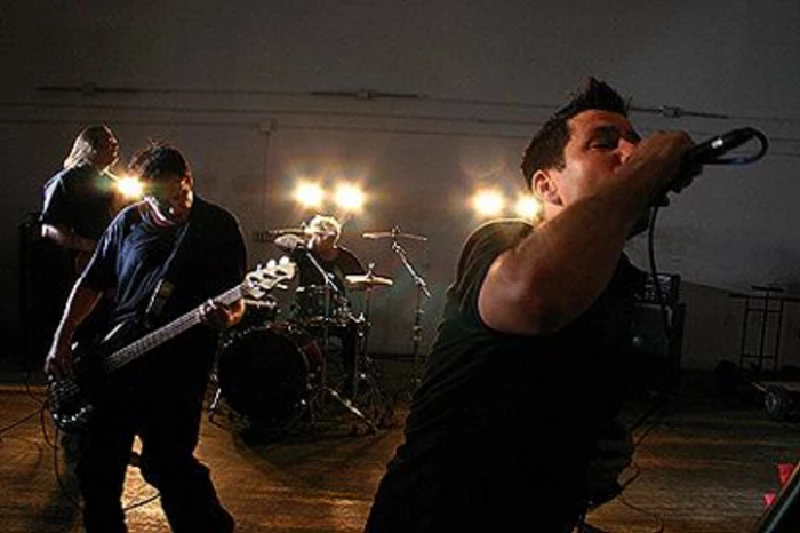
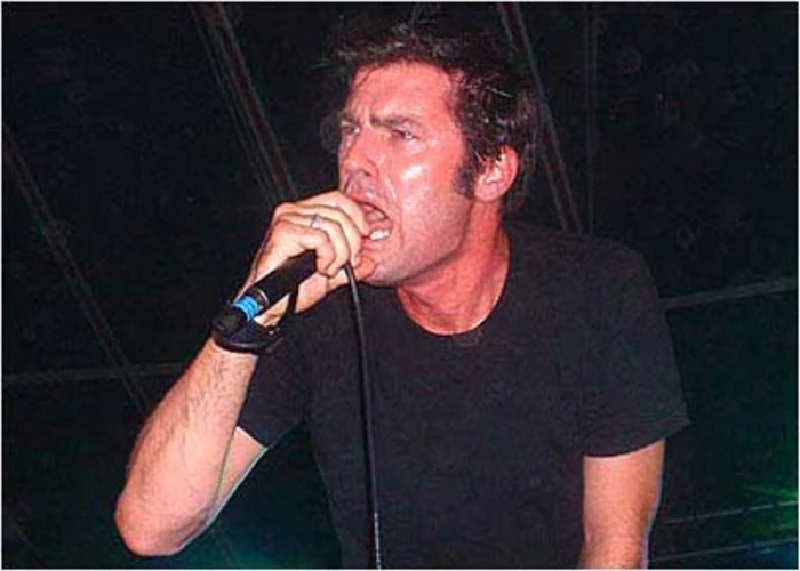

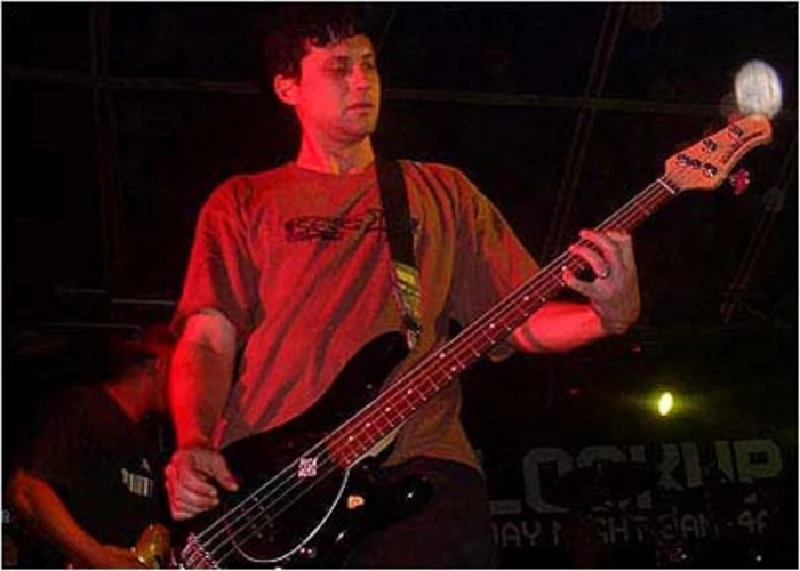
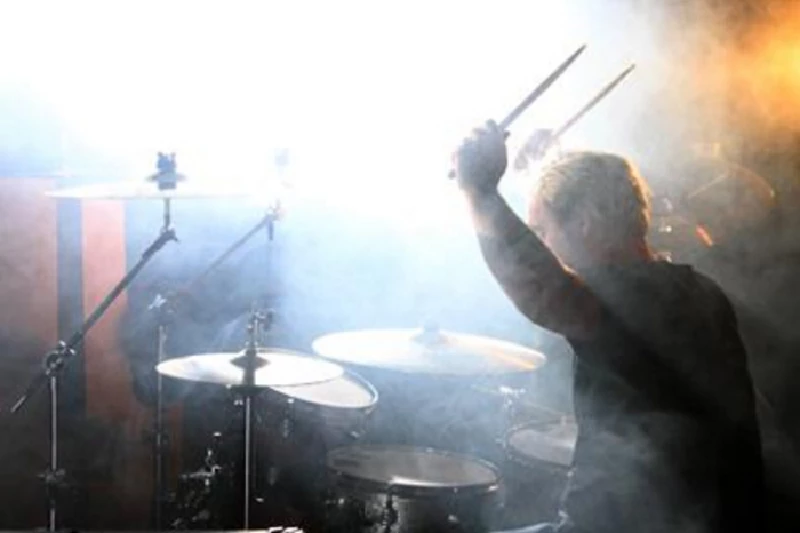
interviews |
|
Interview (2004) |
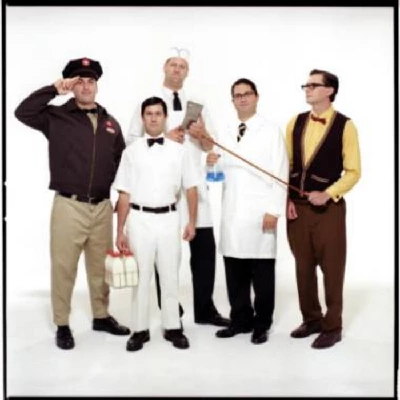
|
| Santa Barbara-based group Lagwagon have been one of the most durable punk bands of the last decade. Ana Grabov chats to bassist Jesse Buglione about their long career and new album, 'Blaze' |
reviews |
|
Live In A Dive (2005) |
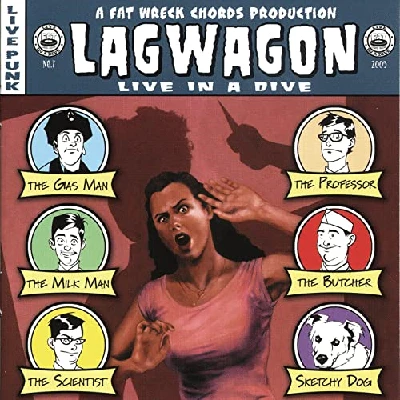
|
| New 22 song compilation of live material from durable Southern California punks' Lagwagon, the seventh instalment in their label Fat Wreck's 'Live in a Dive' series |
most viewed articles
current edition
Peter Doherty - Blackheath Halls, Blackheath and Palace Halls, Watford, 18/3/2025 and 21/3/2025Armory Show - Interview with Richard Jobson
Liz Mitchell - Interview
Lauren Mayberry - Photoscapes
Deb Googe and Cara Tivey - Interview
Max Bianco and the BlueHearts - Troubadour, London, 29/3/2025
Garfunkel and Garfunkel Jr. - Interview
Sukie Smith - Interview
Maarten Schiethart - Vinyl Stories
Clive Langer - Interview
previous editions
Heavenly - P.U.N.K. Girl EPBoomtown Rats - Ten Songs That Made Me Love....
Trudie Myerscough-Harris - Interview
Doris Brendel - Interview
Beautiful South - Ten Songs That Made Me Love...
Pulp - Ten Songs That Made Me Love...
Kay Russell - Interview with Kay Russell
Dwina Gibb - Interview
Sound - Interview with Bi Marshall Part 1
Barrie Barlow - Interview
most viewed reviews
current edition
Davey Woodward - Mumbo in the JumboNigel Stonier - Wolf Notes
Wings - Venus and Mars
Kate Daisy Grant and Nick Pynn - Songs For The Trees
Only Child - Holy Ghosts
Neil Campbell - The Turnaround
Philip Jeays - Victoria
Darkness - Dreams On Toast
Suzanne Vega - Flying With Angels
Charles Ellsworth - Cosmic Cannon Fodder
Pennyblackmusic Regular Contributors
Adrian Janes
Amanda J. Window
Andrew Twambley
Anthony Dhanendran
Benjamin Howarth
Cila Warncke
Daniel Cressey
Darren Aston
Dastardly
Dave Goodwin
Denzil Watson
Dominic B. Simpson
Eoghan Lyng
Fiona Hutchings
Harry Sherriff
Helen Tipping
Jamie Rowland
John Clarkson
Julie Cruickshank
Kimberly Bright
Lisa Torem
Maarten Schiethart